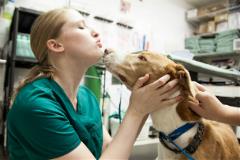Educating Clients on Canine Heartworm Disease: Transmission, Signs, and Testing Needs

Canines are a natural host for heartworms. Their bodies offer a favorable environment that supports the parasites’ requirements to live and complete a life cycle of mating and producing offspring. It is important to educate clients on the following basic heartworm information.
Transmission of Heartworm Disease
In order for the animal to become infected, disease transmission requires the following:
- Heartworm-infected animal
- Infected animals most common to residential and inhabited areas include the fox and coyote
- Within the heartworm-infected animal, adult heartworms have produced offspring (microfilaria) that are now circulating in the animal’s bloodstream
- Mosquito
- When a mosquito bites an infected animal, the blood it draws is infected with the heartworm microfilaria
- Living within the mosquito, over the next 10 to 14 days the microfilaria will develop and mature into the infective larval stage
- The mosquito itself is now able to transmit the infective heartworm larvae to an uninfected natural host animal
- Uninfected natural host animal
- Heartworm larvae enter the host through an infected mosquito’s bite wound
- After six months of living inside the host animal, the larvae will mature into adult heartworms, able to reach one foot in length
- An adult heartworm in a natural host environment can live, mate, and produce for 5 to 7 years
- The heartworm’s longevity strengthens the chance for increasing numbers of adult worms living within a pet
Signs of Heartworm Disease
In the earliest stages of disease, most animals show few or no symptoms of infection. As the infection continues and the symptoms develop, the clinical signs will include:
- Mild, persistent cough
- Reluctance to exercise or play
- Increased fatigue after moderate activity
- Decreased appetite
- Weight loss
As the disease progresses, the animal may suffer from lung disease, heart failure, and organ damage, and may also exhibit excessive abdominal fluid build-up which gives the appearance of a swollen belly.
In animals with large numbers of heartworms, the infection can block the blood flow within the heart leading to a potentially fatal form of cardiovascular collapse referred to as caval syndrome. The clinical signs that indicate this type of blockage include:
- Labored breathing
- Pale gums
- Dark, bloody, or coffee-colored urine
Without immediate surgery to remove the blockage, the outcome is grim.
Testing for Heartworm Disease
Since there are few, if any, physical signs that indicate the initial infection, early prevention is imperative in order to give an animal the best chance for recovery. After an animal is bitten, at least six months need to pass before a test will read positive for heartworm infection. Testing for heartworm disease requires obtaining a small blood sample, which can be drawn during an annual or preventive care visit. Test results are usually available within a short amount of time.
- Test schedule
- Puppies:
- Animals under 7 months of age can begin prevention regimen without a test
- Recommended to test 6 months after the initial test, and then to test yearly if results remain negative
- Adult dogs:
- Animals over 7 months of age
- Dogs that were not previously on a preventive:
- Need to be tested prior to its start
- Next test: 6 months later, and then yearly if results remain negative
- Annual testing is recommended even on adult dogs that test negative and are on a consistent year-round preventive regimen:
- Done as assurance that the prevention program is working
- A dog can be left unprotected and can become infected in ways such as:
- Missed monthly dose
- Monthly dose given late
- Dog spits up or vomits heartworm pill
- Dog rubs off topical preventive medication
- Puppies:
Heartworm disease creates a serious and debilitating health threat. Educating clients on the transmission, clinical signs, and testing requirements helps to increase their awareness of the dangers of heartworm disease.
Learn more by attending a Free Webinar on April 5, 2016:
Effectively Communicating Heartworm Disease Prevention to Pet OwnersGeared toward veterinary technicians, webinar attendees will learn to utilize the ABCD method of teaching to connect with and strengthen the communication between clients and the clinic. Technician attendees will earn 1.0 hour of CE credit.
REGISTER NOW to reserve your spot!
Sources:http://www.vcahospitals.com/main/pet-health-information/article/animal-health/heartworm-disease-in-dogs/773
https://www.heartwormsociety.org/pet-owner-resources/heartworm-basics


Working Here
Our team members are encouraged to be the best they can be... at Covetrus we believe we impact one another.
Learn MoreNews & Events
FDA Cautions Pet Owners Not to Feed Texas Tripe Inc. Raw Pet Food Due to Salmonella, Listeria Monocytogenes
The U.S. Food and Drug Administration is cautioning pet owners not to feed their pets any of the Texas Tripe brand raw frozen pet food listed below because several samples of Texas Tripe raw pet food have tested positive for Salmonella and/or L. mono.
Careers
Are you looking for a place to let your talents shine? At Covetrus, we help our practitioner customers better serve their patients and take pride in providing the best customer experience possible. Search our open positions to see our available opportunities.
Newsletter
Stay current with what’s going on with Covetrus, subscribe to receive our newsletter and email communications. Subscribers will receive the latest information in practice management, sales and marketing, animal health, and more.



-3-(1).png?sfvrsn=2d806d73_0)

Leave a comment